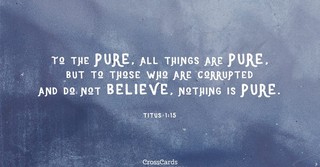
- Recent Translations
- All Translations
Titos 1:16
Share
Settings
Images for Titos 1:16

Titos 1:16 Meaning and Commentary
They profess that they know God
That there is a God; that there is but one, only, true, and living God, the God of Israel, as professed by the Jews; and that this God is Father, Son, and Spirit, as believed by the Christians: for the persons the apostle speaks of were judaizing Christians. Yet this knowledge was but notional; it lay in theory and profession only; they had not a spiritual experimental knowledge of God in Christ, which only has eternal life connected with it:
but in works they deny him.
The Syriac, Arabic, and Ethiopic versions read, "in their own works"; they were not professed, but practical atheists; they owned there was a God, and boasted of their knowledge of him; but their lives and conversations showed that they had no true knowledge of him, and that the fear of him was not before their eyes; these gave the lie to their profession; they practically denied that faith they professed to hold, and the power of godliness, of which they had the form.
Being abominable;
in the sight of God, however esteemed by men; and notwithstanding the vizor and mask of sanctity and religion they put on, which could not screen them from the omniscience of God, who will one day declare he knows them not, and will bid them depart from him, being workers of iniquity.
And disobedient;
to God; to his law, and Gospel; to his ministers and churches; and even to parents and civil magistrates; for of this cast were the false teachers, and their followers, as maybe learned from many passages.
And unto every good work reprobate:
or "unaccustomed", unused to them, as the Arabic version renders it; or rather "without judgment", and understanding, concerning them; there was no good in them, nor was it in them to do good; to do good they had no knowledge, nor any inclination; they were unfit for it, and had not a capacity to perform it; they were not good themselves, and therefore could not do good; the tree must first be made good, ere its fruit will be good; they were without Christ, and without his Spirit, and grace, without which no man can do anything that is spiritually good; they had no true faith, and therefore what they did was sinful; they had neither right principles, from which, nor right ends to which they acted, and therefore were not qualified for the performance of good works; which require that men should be good men, created in Christ Jesus, be believers in him, and have principles of truth and love, and views to the glory of God.